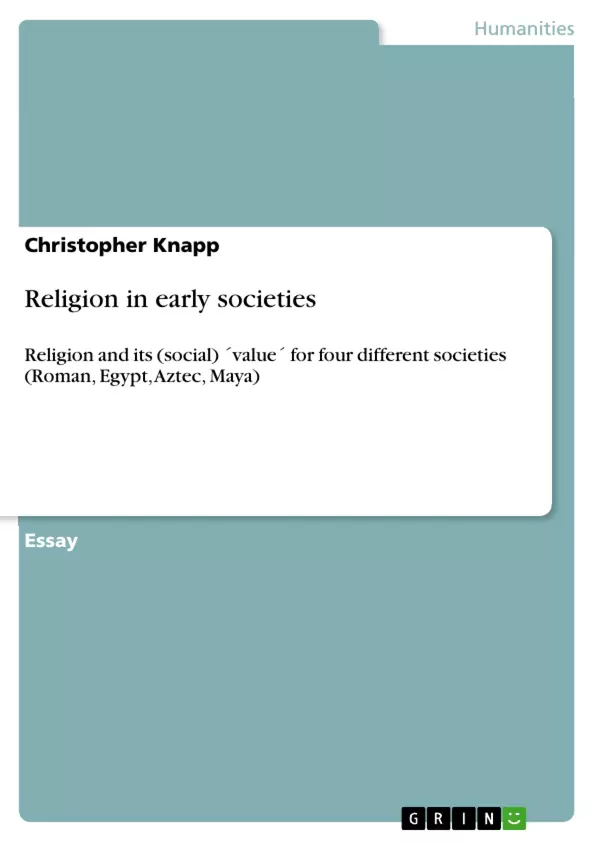A rather comprehensive essay regarding the importance of religion as focal point of ethnicity and, with it, social identity. Four distinct societies are ´examined´: Roman, Maya, Aztec, and ancient Egypt. Author has some M.A.-level prior knowledge, the essay is quite comprehensive and quite well researched (according to the feedback recieved).
Table of Contents
- Aztecs
- Egypt
- Maya
- Rome
Objectives and Key Themes
This assignment examines the impact of ritual and religious beliefs on four early societies: the Aztecs, Egyptians, Maya, and Romans. It aims to compare and contrast the extent to which these religious systems influenced the societies' internal structures and their interactions with other cultures, including both peaceful exchange and conflict. Key themes explored include:- The role of religion in shaping worldview and social integration
- The use of religion as a tool for political control and legitimacy
- The impact of religious beliefs on cultural contact and movement of people
- The relationship between religion and the development of specialized professions and social hierarchies
- The significance of religious rituals in defining cultural identity
Chapter Summaries
Aztecs
Aztec society was profoundly influenced by religion, which served as a unifying force and provided the framework for their worldview. The Templo Mayor, dedicated to the gods Huitzilopochtli and Tlaloc, served as the cosmological center of the empire. Human sacrifice was a central ritual practice, believed to ensure the survival of the Aztec world. Religion played a significant role in Aztec politics, with sacrifice used to instill fear in the population and prevent uprisings. The state religion was imposed on conquered territories, but foreign religious customs were also incorporated into Aztec culture. Aztec beliefs about the end of the world contributed to their downfall, as they saw the Spanish conquest as a sign of the world's end.Egypt
Egyptian religion, particularly the belief in the afterlife, was a central axis of society. Monumental religious architecture, such as pyramids and temple complexes, served as symbols of power and religious beliefs. The deification of the Pharaoh and the elaborate rituals surrounding the afterlife required a complex administrative system and skilled workforce, leading to the development of specialized professions and a complex social hierarchy. Egyptian religious practices, architecture, and beliefs influenced neighboring cultures in Africa, with evidence of Egyptian influence found in the Napata and Meroë cultures. The uniqueness and iconic nature of Egyptian religion helped to preserve its cultural identity even under foreign rule.Maya
Maya rulers were considered descendants of gods, and their religious functions legitimized their power and status. The Maya state religion played a vital role in maintaining social order and ensuring fertility. Religious rituals and beliefs, including the 260-day count calendar, the ballgame, and elaborate art and craft traditions, contributed to a strong sense of Maya identity. Religion played a significant role in inter-city relations, with victorious rulers often changing the religious order of conquered cities. The arrival of the Itza tribe in Chichen Itza demonstrates the influence of religion in cultural contact and migration.Rome
Religion and mythology played an important role in defining early Roman identity. The mythical founders of Rome, Remus and Romulus, provided a supernatural origin story that fostered a sense of community and pride. The Roman state cult, which included the veneration of emperors as gods, served as a unifying force and tool for political control. The deification of emperors helped to legitimize their rule and create a sense of unity within the empire.Keywords
This preview focuses on the interplay of religion, culture, and power in early societies. Key terms include: ritual, religious beliefs, social integration, cultural contact, political control, worldview, identity, monumental architecture, sacrifice, afterlife beliefs, and the impact of these factors on the development of societies and their interactions with other cultures.Frequently Asked Questions
How did religion influence Aztec society?
Religion was a unifying force for the Aztecs, using human sacrifice as a central ritual for cosmological survival and political control over conquered territories.
What was the role of the Pharaoh in ancient Egyptian religion?
The Pharaoh was deified as a god, and religious beliefs about the afterlife necessitated a complex administrative system and monumental architecture like pyramids.
How did the Maya legitimize political power?
Maya rulers were considered direct descendants of gods, and their religious functions were essential for social order and fertility rituals.
What was the significance of Romulus and Remus for Rome?
The myth provided a supernatural origin story that fostered a strong sense of community, pride, and early Roman identity.
Did early religions facilitate cultural contact?
Yes, religious beliefs often influenced neighboring cultures through migration and conquest, as seen in the Egyptian influence on Napata or the Itza tribe's arrival in Maya cities.
- Arbeit zitieren
- M.A. Christopher Knapp (Autor:in), 2000, Religion in early societies, München, GRIN Verlag, https://www.hausarbeiten.de/document/211013


